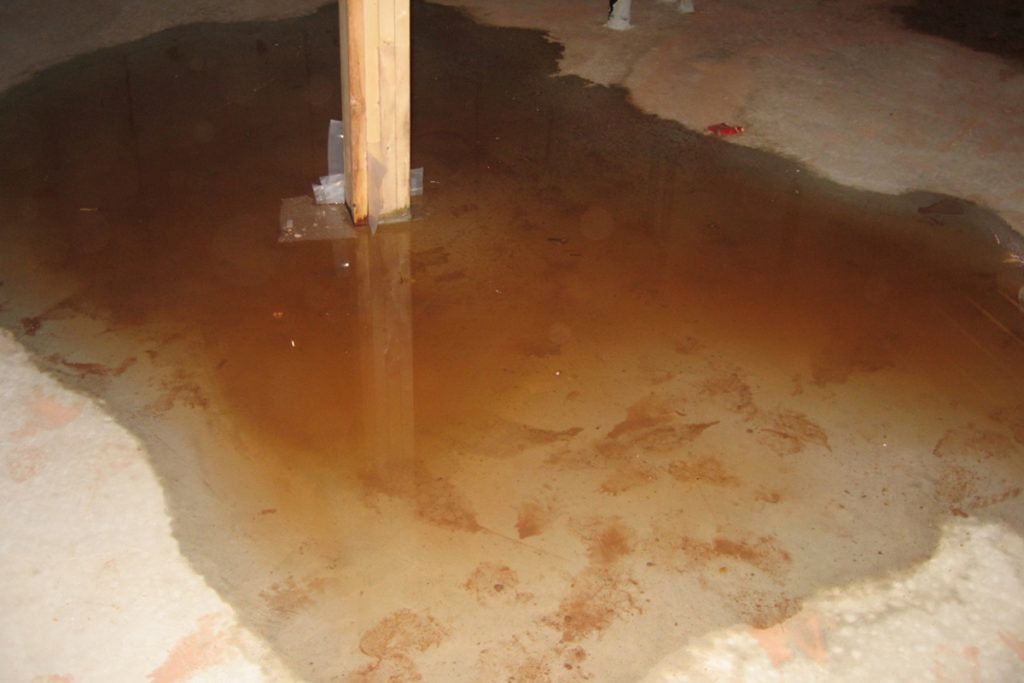During heavy rains many people report that they have leaky basements. After all, this is to be expected because the heavy rains cause a rapid rise in the water table which exerts significant hydrostatic pressure against the foundation of your home. If there is a way for water to penetrate your foundation wall, the hydrostatic pressure will force groundwater through it.
Heavy rains and building envelope leaks
While it is true that many people experience basement leaks after heavy rains, it must be remembered that such heavy rainfalls also test the entire building envelope of your home; effectively a major stress test on the building envelope in general. For example, if you have a leaky roof, during heavy rainstorms you can expect that your roof will leak quite a bit. Similarly, driving rains against the walls of your home commonly cause water to penetrate the building envelope around windows and doors; in particular, those windows and doors with missing or deficient caulking. To compound the problem further, cracked mortar joints in the brick veneer of your exterior walls often allow driving rains to penetrate the building envelope. The water than ends up in the basement after these heavy rains is often attributed to basement leaks when the origin is something else entirely.
How building envelope leaks relate to leaky basements
We hate to state the obvious, but the water that has penetrated the building envelope of your home is subjected to gravity. Since the weight of your home is largely supported by the exterior foundation walls, via the wooden framing of your home, any water that penetrates the building envelope will drain behind your walls downwards onto the top of the foundation. Once rainwater reaches the top of the foundation it quickly makes its way onto your basement floor. So if you go down to the basement and notice water on the floor, it only makes sense that you would assume that you have a leaky basement and therefore require basement waterproofing repairs.
Given the logic of the paragraph above, it is logical to conclude that it is possible for building envelope leaks to be misdiagnosed and treated as if they were bona fide basement leaks, especially in finished basements where the foundation walls cannot be visually inspected. If this occurs, you may unknowingly spend a small fortune on a leaky basement repair when in fact, you simply needed to replace the caulking around your windows and doors.
Note: During heavy rains it is common for window wells to fill-up and dump water from the basement window sill; click for more information about window well leaks.
Dealing with leaky basements during heavy rains
Given what we know about how hydrostatic pressure causes basement leaks and how heavy rains can penetrate the building envelope, it is clear that one must proceed with caution before taking any corrective action, until the source of water in the basement has been positively confirmed.
When you experience a basement leak after heavy rains and there is alot of water in your basement, it is crucial that you avoid panicking. If you panic, the likelihood that you will hire the first available contractor, or waterproofing contractor, to waterproof your basement, is high. Consequently, your chances of making an expensive mistake are high as well.
Before you agree to any leaky basement repair
If it has been proven, without a shadow of a doubt, that the water in your basement is the result of a basement leak then it makes sense to arrange to have waterproofing done; if not, further investigation is required.
To confirm that your wet basement is caused by a foundation leak, a simple hose test is all that is required. By placing your garden hose next to your foundation and allowing water to travel downwards along the foundation and exert hydrostatic pressure on the foundation you are, in fact, simulating heavy rains and their effect on the foundation exclusively. If this water test results in additional water in your basement then you certainly have a leaky basement and should proceed to have it repaired. If however, this hose testing appears to have no noticeable effect in your basement, then it is very possible that your wet basement is the result of a building envelope leak and not a basement leak.
